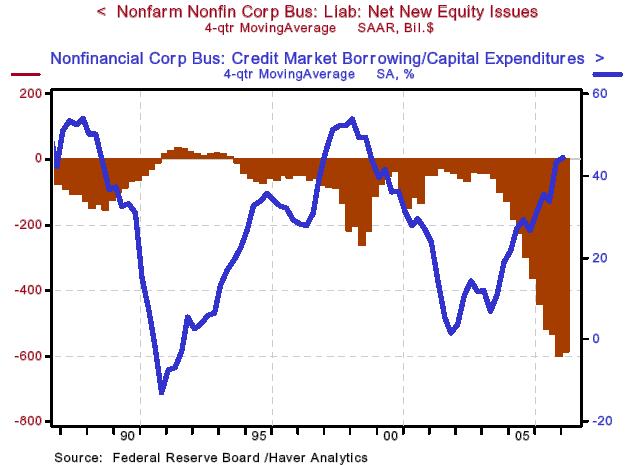If Leveraged Buybacks, Why Not Leveraged Dividends?
Stock-Markets / Stock Market Valuations Jul 25, 2007 - 01:39 PM GMTBy: Paul_L_Kasriel
 The equity investing community seems to get giddy when it hears the words “stock buyback.” And why not if the stock is being bought back out of current profits? But what if the corporation is increasing its debt to fund its stock buybacks? The chart below suggests that is what is occurring now and what occurred in the late 1980s and late 1990s. The red bars in the chart represent the dollar amount of the net issuance of equities of nonfinancial corporations. Readings below zero, which predominate, signify the net “retirement” of equities.
The equity investing community seems to get giddy when it hears the words “stock buyback.” And why not if the stock is being bought back out of current profits? But what if the corporation is increasing its debt to fund its stock buybacks? The chart below suggests that is what is occurring now and what occurred in the late 1980s and late 1990s. The red bars in the chart represent the dollar amount of the net issuance of equities of nonfinancial corporations. Readings below zero, which predominate, signify the net “retirement” of equities.
As the chart shows, record amounts of nonfinancial corporate equities are being retired in this cycle. The blue line in the chart represents nonfinancial corporate borrowing as a percent of their nominal capital spending. If the percentage is rising, as it is now, then this indicates corporations are borrowing for purposes other than to fund their capital spending. If corporate borrowing is rising relative to capital spending and corporations are retiring equity, then it is likely that they are borrowing to fund their share buybacks.

Equity investors do not seem alarmed that corporations are leveraging themselves to fund stock buybacks. Would corporate borrowing to increase dividend payments be greeted equally as gleefully?
As an aside, with some risk starting to be priced into the credit market, funding stock buybacks via borrowing is getting more expensive. Ask Expedia. It recently had plans to buyback 42% of its shares, predominantly with borrowed funds. But with the credit markets having turned more discriminating in recent weeks, Expedia has scaled back its repurchase plan to only 8% of its shares. If creditors continue to become more risk averse and stocks begin to trade on the outlook for profits rather than buybacks – well, I don’t even want to speculate on how long it will take to get the Dow up to 15,000 or maybe even 14,000.
By Paul L. Kasriel
The Northern Trust Company
Economic Research Department - Daily Global Commentary
Copyright © 2007 Paul Kasriel
Paul joined the economic research unit of The Northern Trust Company in 1986 as Vice President and Economist, being named Senior Vice President and Director of Economic Research in 2000. His economic and interest rate forecasts are used both internally and by clients. The accuracy of the Economic Research Department's forecasts has consistently been highly-ranked in the Blue Chip survey of about 50 forecasters over the years. To that point, Paul received the prestigious 2006 Lawrence R. Klein Award for having the most accurate economic forecast among the Blue Chip survey participants for the years 2002 through 2005.
The opinions expressed herein are those of the author and do not necessarily represent the views of The Northern Trust Company. The Northern Trust Company does not warrant the accuracy or completeness of information contained herein, such information is subject to change and is not intended to influence your investment decisions.
Paul L. Kasriel Archive |
© 2005-2022 http://www.MarketOracle.co.uk - The Market Oracle is a FREE Daily Financial Markets Analysis & Forecasting online publication.


